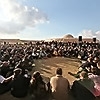 Rabash, “The Agenda of the Assembly – 1,” Article No. 17, Part 2, 1984: And afterwards, everyone should behave the same as in the last three of the “Eighteen Prayer.” In other words, after having pleaded before the Creator, The Zohar says that in the last three of the “Eighteen Prayer,” one should think as though the Creator has already granted his request and he has departed.
Rabash, “The Agenda of the Assembly – 1,” Article No. 17, Part 2, 1984: And afterwards, everyone should behave the same as in the last three of the “Eighteen Prayer.” In other words, after having pleaded before the Creator, The Zohar says that in the last three of the “Eighteen Prayer,” one should think as though the Creator has already granted his request and he has departed.
Question: Why does Rabash draw an analogy between a prayer and the assembly of the society?
Answer: The Torah and all the holy books are intended not for religious people but rather for us to use them in our practical spiritual work.
Question: Is the prayer a program of a person’s actions in the group?
Answer: Of course. What else is it written for? It is an elevation of the desire that you raise to the Creator so that He will give you what is required for your work.
If a person cannot come to prayer, it means that he does not have such a need (Hissaron), there is no sense of lack, strength to move forward, longing, and hunger for spirituality.
Question: Can everything that Rabash writes about the order of the assembly of the society occur at the same place and at the same time?
Answer: Neither geography nor time matters. This can occur at different times, between different friends.
Question: Are these cumulative states?
Answer: Yes, but in each of us they are accumulating arbitrarily, not necessarily at the same place and at the same time. In spirituality, this is not a rigid function.
[238656]
From KabTV’s “The Last Generation” 6/13/18
[238656]
From KabTV’s “The Last Generation” 6/13/18

No comments:
Post a Comment